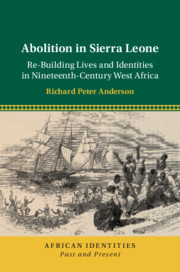Description
Abolition in Sierra Leone
Re-Building Lives and Identities in Nineteenth-Century West Africa
African Identities: Past and Present Series
Author: Anderson Richard Peter
A history of colonial Africa and of the African diaspora examining the experiences and identities of 'liberated' Africans in Sierra Leone.
Language: English
Subject for Abolition in Sierra Leone:
Approximative price 32.87 €
In Print (Delivery period: 14 days).
Add to cart
Abolition in Sierra Leone
Publication date: 03-2022
Support: Print on demand
Publication date: 03-2022
Support: Print on demand
Abolition in Sierra Leone
Publication date: 01-2020
306 p. · 15.6x23.5 cm · Hardback
Publication date: 01-2020
306 p. · 15.6x23.5 cm · Hardback
Description
/li>Contents
/li>Biography
/li>
Tracing the lives and experiences of 100,000 Africans who landed in Sierra Leone having been taken off slave vessels by the British Navy following Britain's abolition of the trans-Atlantic slave trade, this study focuses on how people, forcibly removed from their homelands, packed on to slave ships, and settled in Sierra Leone were able to rebuild new lives, communities, and collective identities in an early British colony in West Africa. Their experience illuminates both African and African diaspora history by tracing the evolution of communities forged in the context of forced migration and the missionary encounter in a prototypical post-slavery colonial society. A new approach to the major historical field of British anti-slavery, studied not as a history of legal victories (abolitionism) but of enforcement and lived experience (abolition), Richard Peter Anderson reveals the linkages between emancipation, colonization, and identity formation in the Black Atlantic.
Introduction. Sierra Leone: African colony, African diaspora; 1. Liberated African origins and the nineteenth century slave trade; 2. Their own middle passage: voyages to Sierra Leone; 3. 'Particulars of disposal': life and labor after 'liberation'; 4. Liberated African nations: ethnogenesis in an African diaspora; 5. Kings and companies: ethnicity and community leadership; 6. Religion, return, and the making of the Aku; 7. The Cobolo War: Islam, identity, and resistance; Conclusion. Retention or renaissance? Krio descendants and ethnic identity; Appendices. A. 'Nations' of children in CMS school rosters by probable coastline of embarkation, 1816–1824; B. 1848 Sierra Leone census; C. Koelle's Aku informants; D. Liberated African memorials in Freetown churches; Select bibliography; Index.
Richard Peter Anderson is Lecturer in Colonial and Postcolonial History at the University of Exeter. He has published in journals including Slavery & Abolition, African Economic History, and History in Africa. He is co-editor of Liberated Africans and the Abolition of the Slave Trade, 1807–1896 (forthcoming) with Henry Lovejoy.
© 2024 LAVOISIER S.A.S.




